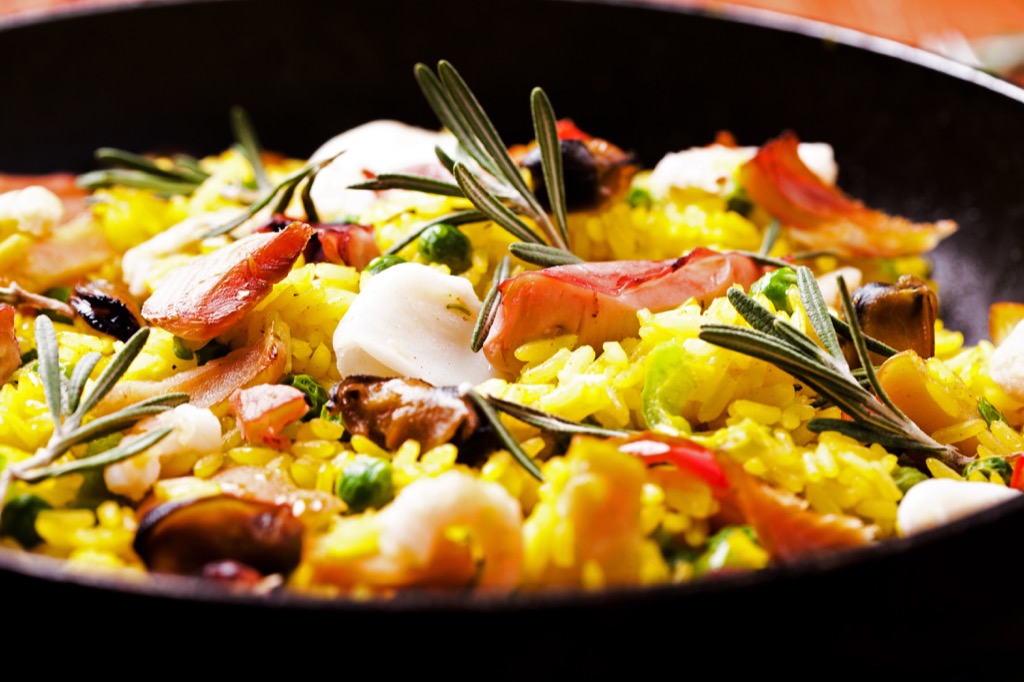5 Worst Things to Serve at a Dinner Party, Etiquette Experts Say

Hosting a fabulous dinner party can feel like one giant juggling act. Before guests arrive, you need to clean the house, prep the food, and get dressed in a statement-making outfit befitting of a host. Once guests arrive, you need to greet them and provide introductions—all while circulating appetizers, putting the finishing touches on the main dish, and ensuring everyone’s satisfied with your food and drink selections. But when it comes to what guests are eating and drinking, etiquette experts say there are a handful of things they’d never serve at a dinner party. Here’s what they recommend avoiding.
RELATED: The 6 Best Things to Ask Guests to Bring—If They Offer.
1
Pork, shellfish, or beef

Depending on your guests, serving beef, shellfish, or pork could be a faux pas.
“If you are hosting people from the Middle East, you might want to avoid things containing pork, shellfish, or alcohol, and if you are hosting people from India, you might want to avoid including beef,” says Jamila Musayeva, a certified etiquette expert. “I would opt for making dishes that can be consumed by everyone regardless of their religion or cultural background.”
2
Sushi

Sushi is a crowd-pleaser but could be more trouble than it’s worth. “While it’s delicious and delicate, maintaining the freshness of raw fish poses a challenge while entertaining a large number of guests and presents food safety concerns,” says Cameron Forbes, founder of the boutique event planning company Forbes Functions.
Items like gazpacho and egg drop soup create a similar issue. “For example, gazpacho must be served cold, requiring refrigeration until just before serving,” says Forbes. “This can cause logistical challenges if the space in your refrigerator is limited, especially when hosting a larger group, as gazpacho left out too long can lose its refreshing taste and become less enjoyable.”
Less finicky items are always better—and safer—since nothing leaves a bad taste in your guests’ mouths quite like food poisoning.
RELATED: 6 Items You Should Always Have in Your Kitchen When Guests Come Over.
3
Chardonnay

Serving chardonnay could ruffle some feathers. “It may seem like a tame choice, but I have never seen guests turn up their noses the way they do when a server tells them their only white wine choice is Chardonnay or, even worse, an American one,” says Morris Roslyn, level 3 sommelier and founder and CEO of wine consultancy Francey Not Fancy. “I was at a wedding last year as a guest, and I watched several people skip wine entirely when they found out that Chardonnay was their only option.”
Instead, serve a pinot grigio or sauvignon blanc as a white wine option. They have a tamer flavor profile and mouthfeel that even beginner wine drinkers can usually appreciate.
4
A complicated main dish

Your guests might feel snubbed if you spend all evening in the kitchen. “I would never serve an overly complex, labor-intensive dish like homemade paella at a dinner party,” says Forbes. “The more complex a recipe, the more attention it requires, and keeping time and effort minimal is critical when catering to a crowd.”
She suggests choosing something more straightforward that can be prepared in advance or with minimal hands-on time: “That way, the host can dedicate their attention to the festivities rather than the foods.”
Plus, the meal is much more likely to turn out well if you can give it the amount of attention it deserves—and that won’t be the case if you’re making it while hugging guests hello.
RELATED: 6 Questions You Should Never Ask at a Dinner Party, Etiquette Experts Say.
5
Extra-strong cocktails

Finally, skip the extra boozy drinks—like Long Island iced teas and martinis—at your next dinner party soiree. Or, if you do, serve just one at the beginning or end of the event.
“The host should always strive to avoid overserving their guests,” says Forbes. “Ensure there is plenty of water and other non-alcoholic options, steer clear of heavy pours, and remind guests to imbibe respectfully and consciously on the invitation.”